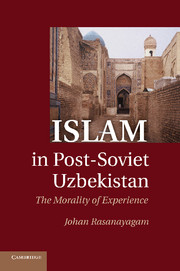Book contents
- Frontmatter
- Contents
- Illustrations
- Acknowledgements
- Note on Transliteration
- MAP: Uzbekistan and its neighbours
- Introduction: Towards an Anthropology of Moral Reasoning
- 1 Islam and Sociality in Pakhtabad and Samarkand
- 2 The New Soviet (Central Asian) Person and the Colonisation of Consciousness
- 3 Good and Bad Islam after the Soviet Union
- 4 The Practical Hegemony of State Discourse
- 5 The Moral Sources of Experience
- 6 Moral Reasoning through the Experience of Illness
- 7 Debating Islam through the Spirits
- 8 Experience, Intelligibility, and Tradition
- Notes
- Bibliography
- Index
4 - The Practical Hegemony of State Discourse
Published online by Cambridge University Press: 01 March 2011
- Frontmatter
- Contents
- Illustrations
- Acknowledgements
- Note on Transliteration
- MAP: Uzbekistan and its neighbours
- Introduction: Towards an Anthropology of Moral Reasoning
- 1 Islam and Sociality in Pakhtabad and Samarkand
- 2 The New Soviet (Central Asian) Person and the Colonisation of Consciousness
- 3 Good and Bad Islam after the Soviet Union
- 4 The Practical Hegemony of State Discourse
- 5 The Moral Sources of Experience
- 6 Moral Reasoning through the Experience of Illness
- 7 Debating Islam through the Spirits
- 8 Experience, Intelligibility, and Tradition
- Notes
- Bibliography
- Index
Summary
This chapter addresses how citizens in Uzbekistan are able to express themselves as Muslim while being subject to an authoritarian regime that narrowly defines what is acceptable Islamic practice and is prepared to punish ruthlessly anything it sees as deviating from it. Previous chapters have argued that hegemony should not be understood as the capacity of a dominant discursive regime simply to determine subjectivities. Rather, the discourses of the postindependence government in Uzbekistan are hegemonic in the sense that, to a significant degree, they fix the terms in which citizens are able to present themselves and others as Muslim and develop their own understandings of Muslim selfhood. The government's construction of good and bad Islam, of cultural authenticity, and of a national spiritual heritage at the heart of its state-building ideologies has made the notion of tradition intensely political. Practices that can be placed within its narrative of a historically developed national tradition are permitted and celebrated by the government, whereas anything that falls outside this narrative or is simply unfamiliar is open to being perceived as alien and potentially dangerous.
The government is prepared to employ the coercive capacities of the state, the organs of law enforcement, and the judiciary to ensure that citizens adopt appropriate attitudes and practices. It encourages an atmosphere of mutual surveillance and fear.
- Type
- Chapter
- Information
- Islam in Post-Soviet UzbekistanThe Morality of Experience, pp. 121 - 153Publisher: Cambridge University PressPrint publication year: 2010

